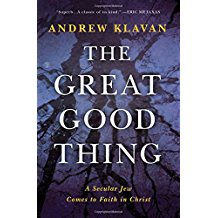The Great Good Thing: A Secular Jew Comes to Faith in Christ
by Andrew Klavan
You might say that I found this book by pure “coincidence,” in that Amazon recommended it to me based on something else I was looking for. But “Coincidence is God’s way of remaining anonymous.”
Andrew Klavan is a writer of suspense novels; three of his novels have been made into movies. But I had never heard of him before now. This book, The Great Good Thing: A Secular Jew Comes to Faith in Christ, is a fantastic story. It is the story of how the author grew up in a secular Jewish household (his mother and maternal grandmother were both atheists; his father “hedged his bets” with moderate practice of Judaism), and how he came to understand the emptiness of Judaism when it is ONLY cultural, but not really religious. It is the story of a man who grew up in a very broken family situation, who nearly went insane, but is able to say now: “I sometimes like to joke that I’ve seen many men go mad, but I’m the only person I’ve ever met who has gone sane. It’s not really a joke….”
I found his story to be very interesting because it was the opposite of an instantaneous conversion: it was very long, and very gradual. He is a man who first came to love good stories, and that opened him up to seeing that all of western civilization and literature is founded on the Bible and the person of Jesus Christ. Then he came to enter into “the Great Conversation” of western literature and thought, and was dramatically moved away from the prevailing philosophies of the 1960s through insights from literature. Here’s an example from his own words:
“… like Hamlet, the post-modernists had dismissed the notion of absolute morality. [Quoting from Hamlet:] ‘There is nothing either good or bad, but thinking makes it so.’ But there was one big difference. Hamlet said these things when he was pretending to be mad. My professors said them and pretended to be sane. Shakespeare was telling us, it seemed to me, that relativism was not just crazy, it was make-believe crazy, because even the people who proclaimed it did not believe it deep down. If, after all, there is no truth, how could it be true that there is no truth? If there is no absolute morality, how can you condemn the morality of considering my culture better than another? Relativism made no sense, as Shakespeare clearly saw.” [p. 137]
Another book that profoundly affected him was Dostoevsky’s Crime and Punishment. “From the moment I read Crime and Punishment — though I did not know it, though it took me decades, though I was lost on a thousand detours along the way — I was traveling away from moral relativism and toward truth, toward faith, toward God.” [p. 139]
One of the best chapters of the book (in my opinion) is Chapter 11, titled “Five Epiphanies.” In this chapter, he recounts five events by which he, in different ways, encountered God. Some of these encounters were mystical, others were more practical — as when he came to see that there must be an “Ultimate Moral Good”:
“if we concede that one thing is morally better than another, it can only be because it is closer to an Ultimate Moral Good, the standard by which it’s measured. An Ultimate Moral Good cannot just be an idea. It must be, in effect, a personality with consciousness and free will….. true, objective good and evil, in order to be good and evil, have to be aware and intentional. So an Ultimate Moral Good must be conscious and free; it must be God. So we have to choose. Either there is no God and no morality whatsoever, or there is morality and God is real.” [p. 205-206]
Andrew Klavan sums up his five epiphanies as “The truth of suffering. The wisdom of joy. The reality of love. The possibility of clear perception. The laughter at the heart of mourning.” [p. 210]
Along the way, he had to wrestle with some very difficult objections to Christianity — such as the problem of antisemitism. His thoughts on this matter are very insightful (I will not attempt to summarize them, but they are well worth reading and pondering).
As a Catholic priest, I find this book to be an inspiring story of a man who became a truth-seeker, and from that quest for ultimate truth and goodness, came to know Our Lord Jesus Christ as God Incarnate. It is a good witness to us that God’s time is not our time, and His ways are not our ways. We would like to see our loved ones go through instantaneous conversions, but sometimes, the longer and harder road is actually the better road, the road that leads to a more solidly founded faith and relationship with Christ. So, if you love a good conversion story, and a book that makes you think — so that you follow along with the author through his journey to God — then The Great Good Thing is the book for you.
— Fr. Ben J. Cameron, C.P.M.
